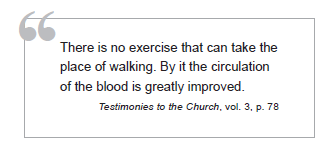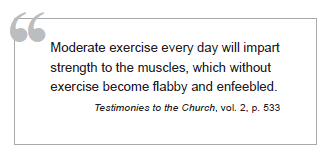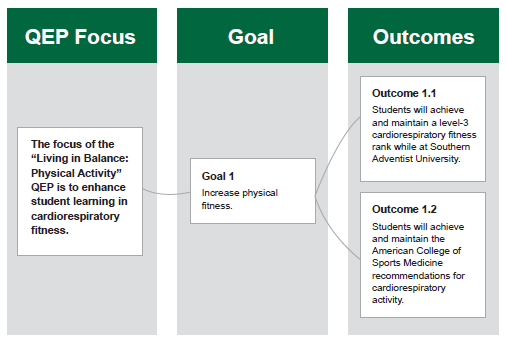
Learning Goals

Southern Adventist University has five general education student learning areas: spiritual development, intellectual development, individual and social development, physical development, and discipline-specific competence. With the “Living in Balance: Physical Activity” QEP, Southern Adventist University seeks to strengthen student learning in the general education area of physical development.
The student learning outcomes are based on findings from the literature review, best practices, the needs of Southern Adventist University students, and a recommitment to promoting healthy lifestyle principles foundational to Seventh-day Adventist education. Chart 3 is an overview of the two student learning outcomes identified for increasing physical activity.

The Rockport One-Mile Walking Test (see Appendix A) was selected as the cardiorespiratory fitness assessment because of its reliability and validity as a test instrument (D’Alonzo, Marbach, and Vincent, 2006) and because of its ease to administer independently. Students will receive instructions for the assessment in activity courses and during the mid-semester campus-wide fitness assessment week. The Rockport walk shows the current level of physical fitness and provides a way to measure cardiorespiratory fitness throughout the lifespan. Improving and maintaining physical fitness calls for a consistent physical activity program. Students are encouraged to meet the minimum ACSM physical activity level each week as part of beginning or maintaining an active lifestyle. Also, the two required activity courses PEAC 125–Fitness for College (first-year course) and PEAC 425–Fit for Hire (capstone course) will have the recommended ACSM physical activity levels as part of the course requirements.

Helping students develop a physically active lifestyle is the purpose of the second student learning outcome.
The American College of Sports Medicine is considered by health and fitness educators to be a leader in setting standards for physical activity and fitness across the lifespan. We chose to use ACSM as our source for definitions, activity requirements, and fitness testing. Physical activity is defined as “any bodily movement produced by the contraction of skeletal muscles that results in a substantial increase over resting energy expenditure” (Thompson, Gordon, and Pescatello, 2010, p. 2).
The ACSM physical activity parameter we expect Southern Adventist University students to know and adopt is that “all healthy adults aged 18-65 need moderate intensity aerobic physical activity for a minimum of 30 minutes five days per week, or vigorous activity for a minimum of 20 minutes three days per week” (Thompson et al. 2010, p. 8).
The ACSM cardiorespiratory physical activity levels will be assessed using the International Physical Activity Questionnaire (IPAQ). The IPAQ will be completed by students when enrolled in physical activity courses on the physical activity website designed by Southern Adventist University’s School of Computing.